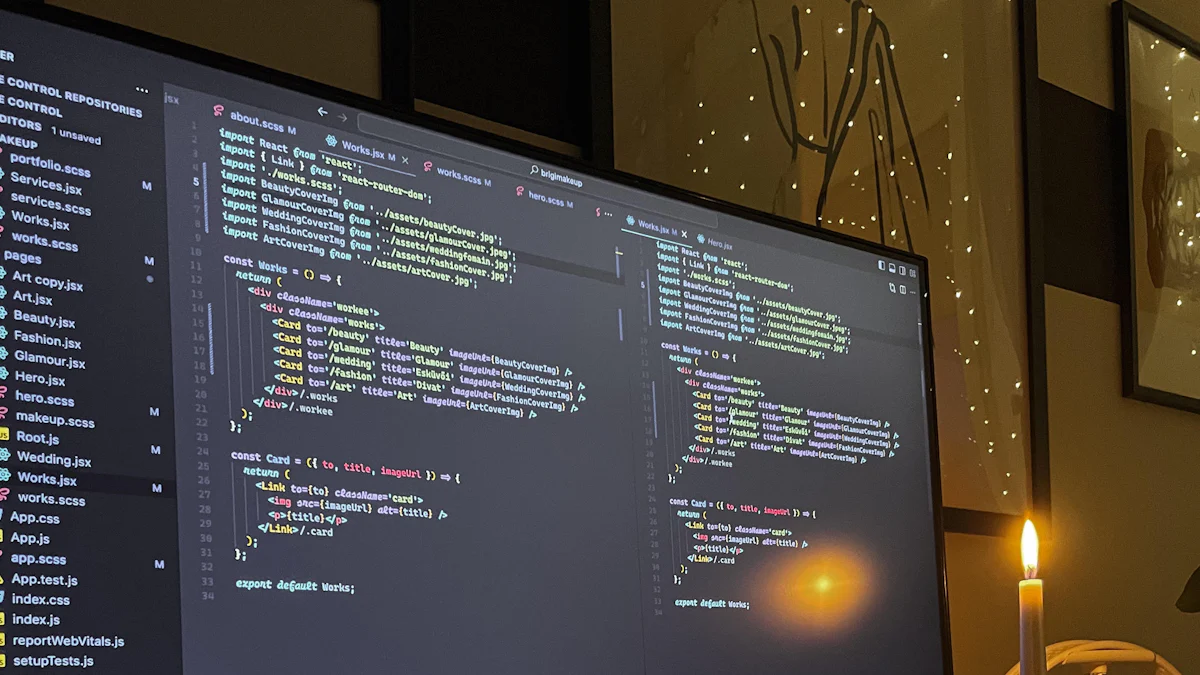How to Land a Remote Software Engineer Job in 2025
Try Aihirely for
Smarter Interview Prep
Experience real-time AI support tailored to your Resume.
Boost your confidence and ace every question with
AI Mock Interview.

Image Source: pexels
The demand for remote software engineer jobs is skyrocketing in 2025. Companies are embracing flexible work models, creating opportunities for engineers to work from anywhere. Roles like DevOps engineers, mobile developers, and blockchain specialists are especially sought after as businesses adopt cutting-edge technologies. You can tap into this trend by honing your skills and preparing strategically. Start by updating your LinkedIn profile, mastering programming languages, and setting up a productive workspace. A self-driven attitude and clear communication will also set you apart. With the right approach, you can land your dream role in this thriving market.
Key Takeaways
-
Learn important coding languages like JavaScript, Python, and Java to improve your chances of getting a job.
-
Build good communication and teamwork skills to succeed in remote jobs.
-
Use well-known remote job websites and tech platforms to find great jobs.
-
Get ready for interviews by practicing coding tasks and creating a neat virtual workspace.
-
Change your resume and cover letter for each job to highlight your remote work skills and excitement.
Essential Skills for Remote Software Engineer Jobs

Image Source: pexels
To thrive in remote software engineer jobs, you need a mix of technical expertise and soft skills. Let’s break it down.
Technical Skills
Proficiency in programming languages and frameworks
You can’t land a remote software engineering role without strong coding skills. Companies in 2025 are looking for developers skilled in:
-
Front-end frameworks like React and Angular
-
Back-end frameworks such as Node.js and Django
-
Blockchain technologies like Solidity and Ethereum
If you’re into mobile development, Swift, Kotlin, and Flutter are must-haves. For game developers, Unity and Unreal Engine are in demand. Mastering these tools will make you stand out.
Experience with cloud technologies and DevOps tools
Cloud computing is reshaping how businesses operate. You’ll need experience with platforms like AWS, Azure, or Google Cloud. DevOps tools like Docker, Kubernetes, and Jenkins are also essential. These tools help streamline development and deployment, which is critical for remote teams.
💡 Tip: Familiarize yourself with CI/CD pipelines and automation tools to boost your efficiency.
Familiarity with remote collaboration tools
Remote work thrives on effective communication. Tools like Slack, Microsoft Teams, and Zoom are staples for virtual teams. Knowing how to use these tools will help you stay connected and productive.
Soft Skills
Communication and collaboration abilities
Strong communication is the backbone of remote work. You’ll need to express your ideas clearly, whether through chat, email, or video calls. Collaboration tools are great, but your ability to actively listen and contribute to discussions will set you apart.
🗨️ Note: True collaboration happens when everyone shares knowledge and works toward a common goal.
Self-discipline and time management
Remote jobs require you to manage your time effectively. Without a manager looking over your shoulder, you’ll need to stay disciplined. Create a daily schedule and stick to it. Tools like Trello or Asana can help you track tasks and deadlines.
Problem-solving and adaptability
Remote work often comes with unexpected challenges. Whether it’s a technical issue or a miscommunication, you’ll need to think on your feet. Adaptability is key to navigating these hurdles and keeping projects on track.
By mastering these skills, you’ll position yourself as a top candidate for remote software engineer jobs. Employers value professionals who can deliver results while working independently.
Where to Find Remote Software Engineer Jobs

Image Source: pexels
Finding remote software engineer jobs can feel overwhelming, but knowing where to look makes all the difference. Here’s how you can uncover the best opportunities.
Job Boards and Platforms
Popular remote job boards
Remote job boards are a great starting point. They list thousands of opportunities tailored for remote work. Some of the most popular ones include:
-
Underdog.io: Perfect for startup enthusiasts with a simple application process.
-
JustRemote: Offers advanced filters to find tech-specific roles.
-
Wellfound: Formerly AngelList Talent, it connects you with remote tech startups.
-
We Work Remotely: One of the largest boards featuring high-profile roles.
-
Working Nomads: Focuses on tech and design jobs for digital nomads.
-
FlexJobs: Provides a variety of remote positions with filtering options.
💡 Pro Tip: Bookmark these sites and check them regularly to stay ahead of the competition.
Tech-specific platforms
If you’re looking for something more niche, tech-specific platforms are your best bet. Explore options like:
These platforms let you filter jobs based on your expertise, making your search more efficient.
Networking and Online Communities
Leveraging LinkedIn and virtual events
LinkedIn is a goldmine for remote job seekers. Start by optimizing your profile to highlight your skills and experience. Then, connect with industry professionals and join relevant groups. Don’t forget to participate in discussions to boost your visibility.
Virtual events and webinars are also great for networking. Attend these events to meet recruiters and professionals who can refer you to open positions.
🗨️ Note: A strong LinkedIn presence can make recruiters come to you instead of the other way around.
Participating in developer communities
Developer communities are more than just forums. They’re places to learn, grow, and find opportunities. By joining these communities, you can:
-
Discover job openings and side gigs.
-
Collaborate on projects and showcase your skills.
Communities like GitHub, Stack Overflow, and Reddit’s programming subreddits are excellent starting points.
Directly Approaching Companies
Researching remote-friendly companies
Some companies are more remote-friendly than others. To find them:
-
Identify your values and goals.
-
Use resources like Virtual Vocations to research company culture and benefits.
-
Check company websites and employee reviews for insights.
-
Create a shortlist of companies that align with your criteria.
-
Stay updated by setting up email alerts and following them on LinkedIn.
Reaching out to hiring managers
Sometimes, the best way to land a job is by reaching out directly. Connect with hiring managers on LinkedIn or through email. Build relationships by engaging with their content or asking for informational interviews. This approach shows initiative and can set you apart from other candidates.
💬 Tip: Personalize your messages to show genuine interest in the company and role.
By combining these strategies, you’ll increase your chances of finding the perfect remote software engineer job.
Preparing for Remote Job Interviews
Preparing for interviews is crucial when applying for remote software engineer jobs. Here’s how you can ace them.
Technical Interview Preparation
Practicing coding challenges
Coding challenges are a staple of technical interviews. They test your problem-solving skills and proficiency in programming languages. Platforms like Pramp offer mock interviews and coding exercises tailored for remote roles. Regular practice will help you tackle these challenges with confidence.
Reviewing system design concepts
System design questions evaluate your ability to create scalable and efficient architectures. Brush up on concepts like load balancing, database sharding, and caching. Here’s a quick overview of common technical interview topics:
| Category | Description |
|---|---|
| Coding and Programming | Tests your coding skills and problem-solving abilities. |
| System Design | Evaluates your understanding of large-scale system architecture. |
| Data Structures and Algorithms | Focuses on complexity analysis and algorithmic thinking. |
| Database and SQL | Assesses your knowledge of database management and SQL queries. |
| System Architecture | Covers networking, scalability, and overall system structure. |
| Testing and Debugging | Examines your grasp of testing principles and debugging techniques. |
| Web Development | Includes questions on web technologies and application development. |
Cultural Fit and Behavioral Questions
Preparing for remote work-related questions
Employers want to know if you’ll thrive in a remote environment. Expect questions like:
-
Would you prefer a remote, in-person, or hybrid job?
-
How do you stay productive while working remotely?
-
What’s your ideal communication style for remote teams?
Prepare thoughtful answers that highlight your ability to work independently and collaborate effectively.
Demonstrating adaptability and problem-solving
Showcase your adaptability by sharing examples of how you’ve handled change or learned new tools quickly. Highlight your problem-solving skills by discussing situations where you identified challenges and implemented solutions. For instance:
-
Talk about how you incorporated feedback to improve a project.
-
Share an experience where you proactively addressed a technical issue.
These examples will demonstrate your ability to handle the unique challenges of remote work.
Virtual Interview Tips
Setting up a professional virtual environment
Your interview setup speaks volumes about your professionalism. Follow these steps:
-
Test your video-conferencing tools to avoid technical glitches.
-
Choose a quiet, well-lit space with a clean background.
-
Communicate expectations with the interviewer, such as timelines and technology access.
A polished setup shows you’re serious about the role.
Practicing clear communication
Strong communication is vital for remote roles. To improve:
-
Maintain eye contact by looking into the camera.
-
Speak clearly and concisely.
-
Hone your writing skills for follow-up emails or chat-based discussions.
Focus on being clear, consistent, and concise during the interview. This will leave a lasting impression on your interviewer.
Crafting a Winning Resume and Cover Letter
Your resume and cover letter are your first chance to impress potential employers. They need to showcase your skills, experience, and enthusiasm for remote software engineer jobs. Here’s how to make them stand out.
Tailoring Your Resume
Highlighting remote work experience
If you’ve worked remotely before, make it a focal point. Employers want to see that you can thrive in a remote environment. Highlight roles where you collaborated with distributed teams or managed projects independently. Mention tools like Slack, Trello, or Zoom to show your familiarity with remote workflows. If you haven’t worked remotely yet, emphasize skills like self-discipline and time management to demonstrate your readiness.
Quantifying achievements with metrics
Numbers speak louder than words. Instead of saying, “Improved system performance,” try, “Boosted system performance by 30% through optimized algorithms.” Use metrics to show the impact of your work. For example, mention how you reduced deployment times or increased user engagement. This approach makes your achievements tangible and memorable.
Writing a Standout Cover Letter
Personalizing the letter for each application
A generic cover letter won’t cut it. Research the company and tailor your letter to their needs. Mention specific details, like their recent projects or values, to show you’ve done your homework. Align your skills with the job description to demonstrate why you’re the perfect fit. This extra effort can set you apart from other candidates.
Showcasing enthusiasm for remote work
Start your letter with a genuine expression of excitement for the role. Share a brief story about how remote work has positively impacted your career or life. For instance, you could mention how it allowed you to collaborate with global teams or balance work and personal growth. Employers value candidates who are passionate about remote opportunities.
Showcasing Personality
Including a portfolio or GitHub link
Your resume and cover letter are just the beginning. Include links to your portfolio, GitHub, or personal website to give employers a deeper look at your work. Highlight projects that align with the role you’re applying for. This shows initiative and gives them a reason to explore your skills further.
Adding a personal statement
A short personal statement can add a human touch to your application. Share what drives you as a software engineer or why you’re passionate about solving complex problems. Keep it concise but impactful. This helps employers connect with you on a personal level.
By following these tips, you’ll craft a resume and cover letter that grab attention and showcase your potential. Remember, every detail counts when you’re competing for top remote roles.
Landing a remote software engineering job in 2025 is within your reach if you take the right steps. Focus on building essential skills, like self-discipline, effective communication, and problem-solving. Highlight your remote work experience and adaptability in your resume. Stay proactive by tracking applications, networking, and maintaining a consistent job search schedule.
Remote work offers incredible opportunities, from flexibility and autonomy to access to global roles. It’s a chance to improve your work-life balance and save on commuting costs. Embrace these benefits and stay persistent. With the right mindset, you’ll thrive in this exciting new era of work.
FAQ
How do I stand out when applying for remote software engineer jobs?
-
Tailor your resume and cover letter for each role.
-
Highlight remote work experience and technical skills.
-
Include a portfolio or GitHub link to showcase your projects.
💡 Tip: Personalize your application by mentioning the company’s values or recent achievements.
What tools should I master for remote software engineering?
You’ll need:
-
Programming tools: Git, GitHub, or GitLab.
-
Collaboration tools: Slack, Zoom, and Trello.
-
Cloud platforms: AWS, Azure, or Google Cloud.
🛠️ Familiarity with DevOps tools like Docker and Kubernetes is also a big plus.
Can I get a remote job without prior remote work experience?
Yes, you can! Focus on transferable skills like self-discipline, time management, and communication. Highlight projects where you worked independently or collaborated with distributed teams.
🚀 Prove your readiness by emphasizing your ability to adapt and deliver results remotely.
How do I prepare for a remote job interview?
-
Practice coding challenges and system design questions.
-
Set up a professional virtual environment.
-
Prepare answers for remote work-related questions.
🗨️ Note: Clear communication and a polished setup can leave a lasting impression.
What’s the best way to network for remote roles?
-
Optimize your LinkedIn profile and connect with industry professionals.
-
Join developer communities like GitHub or Stack Overflow.
-
Attend virtual events and webinars to meet recruiters.
🌐 Networking can open doors to opportunities you might not find on job boards.
